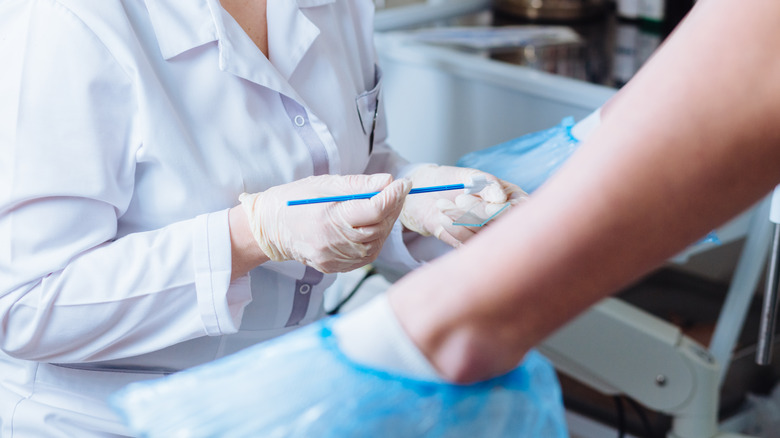How To Make Your Next Pap Test More Comfortable
For adult patients with a cervix, doctors issue a Pap test, or Pap smear, about every three years to check for cervical cancer (via Mayo Clinic). The American Cancer Society estimates the number of new invasive cervical cancer cases will exceed 14,000 in 2022. Early detection is key when it comes to treatment and protection against disease progression. However, the procedure itself isn't always the most comfortable experience.
In order to obtain cell samples from the cervix, doctors usually have patients lie on their back and position one foot in each foot rest (via Medical News Today). The physician will then utilize a speculum, a medical tool resembling the look of a duck's bill (via Healthline). The speculum will be inserted into the vagina to keep the vaginal walls open in order for the doctor to access the cervix with a swab for cell collection.
When the speculum is inserted, the stretching sensation can cause physical discomfort. By communicating this to your doctor, they can use a smaller-sized instrument. OB/GYN Dr. Damian P. Alagia explains via The Healthy, " ... bodies are not all the same shape and size and neither are speculums. Choosing a smaller speculum may help your physician navigate a smaller vagina or tipped cervix."
Tips for easing discomfort and anxiety during a Pap smear
Because Pap tests aren't the most comfortable experience, some doctors allow patients to do the speculum insertion themselves to mitigate the discomfort, reports Self. Speculum instruments typically are made of metal and can feel cold upon insertion. So another way to ease discomfort is to request a plastic speculum or for the metal instrument to be warmed up before insertion.
An infection in the bladder, urethra, or vagina could also contribute to physical discomfort experienced during a Pap smear (via The Healthy). Informing your doctor beforehand of any health conditions you're experiencing can help them potentially modify the procedure to your comfort. Some other quick tips: Use the bathroom before a Pap smear to rid your bladder of any additional pressure, and talk to your doctor about shifting your physical position during the examination for more comfort.
If you generally feel nervous before your Pap test, experts suggest relaxation techniques. Dr. Soma Mandal, author of "Menopause I Do Not Fear You," suggests via The Healthy, "Bring anything — a podcast, music, a meditation app — that can help you relax before and during the procedure."


